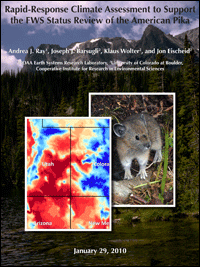PSL Contributes to FWS Endangered Species Status Review of the American Pika
February 5, 2010
 American Pika (courtesy FWS) |
 Cover of the "Rapid-Response Climate Assessment to Support the FWS Status Review of the American Pika" |
At the request of the U.S. Fish and Wildlife Service (FWS), researchers from ESRL's Physical Sciences Laboratory and the Cooperative Institute for Research in Environmental Sciences (CIRES) have developed a rapid-response assessment of climate observations and projections of change to support the FWS status review of the American Pika to determine if it is warranted for protection under the Endangered Species Act (ESA). Pikas are members of the rabbit family and generally found in rockfields above the treeline.
The core finding of the report is that in pika habitat, the average summers of the mid-21st century will be warmer than the warmest summers of the recent past.The 2050 June-July-August temperature projection is about +3°C (5.4°F), higher than the recent climatology, for all 22 locations analyzed. High-end projections are about 1°C warmer than the average projections. To account for the fact that pikas live at a range of elevation in a given area, these projections are scaled to the vertical ranges of habitat.
Climate change is thought to be an important threat for the pika, because of increasing temperatures in the mountainous regions of the western United States that are the pika habitat Climate change might have effects resulting in individual mortality, population extirpations, and reduced species range for the pika. The report summarizes findings from peer-reviewed regional studies, interprets downscaled climate projections, and presents new graphics and data summaries derived from existing datasets. This report adds Western regional detail from recent literature and new findings from analyzing published observational datasets and interpreting IPCC projections at smaller spatial scales. Knowledge about climate variability and change is rapidly evolving, so this report is a snapshot based on the best available science as of mid-2009.
The climate science expertise available at NOAA is a vital resource for state and federal agencies, who more and more frequently must incorporate impacts of climate change into their planning and policy documents. The report for FWS is an example of NOAA partnering with other federal agencies to include state-of-the-art climate knowledge in natural resource decision-making. Such partnerships also help ensure that NOAA science remains relevant to the needs of the nation.
| Contact: Andrea Ray | More Information:
|